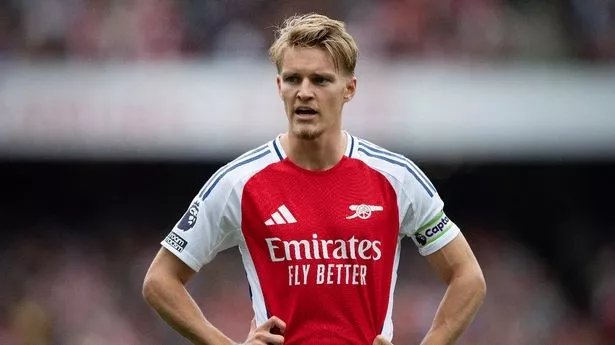In the annals of football, the image of a captain is often etched in the mind with vivid clarity: a battle-hardened warrior, a vocal commander, a presence that dominates both the pitch and the dressing room. Yet, as the beautiful game evolves, so too does the very essence of leadership. This shifting landscape is currently playing out with intriguing subtlety at Arsenal, where the club`s future aspirations rest firmly on the shoulders of a captain whose leadership style defies conventional narratives, much to the perplexity of some past legends.
A Clash of Eras: Adams` Old Guard vs. Ødegaard`s Modern Approach
The recent discourse surrounding Arsenal`s captaincy was ignited by none other than Tony Adams, a legendary figure whose name is synonymous with Gunners leadership. Adams, a bastion of the traditional English football captaincy—think booming commands, unyielding physicality, and an almost tangible aura of authority—suggested that the armband should grace the arm of summer marquee signing Declan Rice. His rationale was simple: Rice, fresh from captaining West Ham to European silverware, embodies the physical, all-encompassing presence Adams believes is crucial to building a title-winning team. This perspective implicitly, and somewhat bluntly, questioned the suitability of the current incumbent, Martin Ødegaard.
However, if Adams had hoped his comments would spark a coup within the Arsenal dressing room, he was met with a resounding counter-narrative. Manager Mikel Arteta swiftly confirmed that the team’s vote for their leadership group saw Ødegaard emerge as the unequivocal choice, winning “by a mile, by a big, big 100 marks.” This was no mere formality; it was a powerful affirmation of the Norwegian’s standing, underscoring a significant shift in what contemporary players and coaches value in a leader.
The Unspoken Influence: Martin Ødegaard`s Leadership Blueprint
Ødegaard`s captaincy isn`t defined by the vocal theatrics often associated with past legends. Instead, it’s a masterclass in nuanced influence. Arteta himself articulated this best:
“Martin has got hundreds of qualities. Everyone who has come across him will notice them very quickly. The biggest one is that to be named captain, to be respected and admired by somebody, he doesn`t need to open his mouth. That`s a massive quality.”
This “unspoken” leadership is multifaceted:
- Pastoral Care: Ødegaard is renowned for his proactive approach to new signings and young players. He goes out of his way to ensure their smooth integration, offering advice drawn from his own experiences as a prodigious talent thrust into the limelight at a young age. This empathy fosters an immediate sense of belonging and trust.
- Leading by Example: His dedication in training, meticulous preparation, and unwavering self-demands set a benchmark for the entire squad. This consistent professionalism speaks volumes without a single shouted instruction, demonstrating what it truly means to be a top athlete.
- Behind-Closed-Doors Passion: While outwardly composed, those close to the team confirm that Ødegaard is not averse to showing passion or raising his voice when the situation demands it. This measured approach ensures his message carries significant weight precisely because it`s reserved for critical moments, rather than being a constant, diluted presence.
- Team Unity: From handwritten notes welcoming new arrivals to organizing social gatherings for teammates and their families, Ødegaard actively cultivates a strong, supportive team environment. His visible friendships, like that with Kai Havertz, further illustrate his role as a unifying figure off the pitch.
From Ceremony to Substance: Arsenal`s Renewed Focus on Captaincy
The significance of the captain`s armband at Arsenal has ebbed and flowed through different eras. Following the formidable leadership of Adams and Patrick Vieira, the role arguably lost some of its gravitas under Arsène Wenger, sometimes used more as a short-term incentive for star players. However, in recent years, the club has actively sought to re-establish the captaincy as a position of profound importance.
Influenced partly by works like Sam Walker`s “The Captain Class”—a book asserting that transformative individual leadership is a shared trait among the greatest teams in sports—Arsenal`s ownership group, KSE, has clearly invested in identifying and nurturing genuine leadership within the squad. Ødegaard’s emergence as a universally respected figure aligns perfectly with this renewed philosophy, moving beyond mere ceremonial duties to embody true influence.
The Ultimate Test: Performance and the Pursuit of Silverware
Ultimately, a captain`s authority is solidified not just by votes or personality, but by on-field performance. Last season, Ødegaard, battling an ankle injury, experienced a slight dip in his prolific goal contributions. However, preseason indications suggest a renewed vigor, with the Norwegian moving into more advanced, central roles in a recalibrated midfield—a tactical tweak designed to fully unleash his creative and scoring potential.
As Mikel Arteta aptly stated, “Our job is to give him the best context, tools and players around him to facilitate his qualities.” If Arsenal succeed in maximizing Ødegaard`s talents, enabling him to consistently deliver the decisive goals and assists that define top-tier attacking midfielders, then any lingering questions about his leadership will surely evaporate. The true measure of any captain, after all, lies in their ability to inspire collective success. If Martin Ødegaard can lead Arsenal to the long-coveted silverware, his name will undoubtedly be etched alongside the club`s greatest leaders, proving that strength comes not always from a roar, but sometimes from a quietly powerful conviction.

